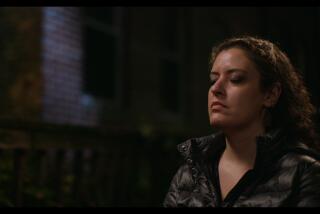Review: ‘Of Two Minds’ takes intimate look at bipolar disorder
- Share via
More than 5 million Americans are affected by bipolar disorder, but it was one person in particular who influenced co-director Lisa Klein to make the documentary “Of Two Minds.” That would be Klein’s older sister Tina, who died at age 42.
The personal connection gives “Of Two Minds” (co-directed with Doug Blush) its greatest strength, the intimate bond it establishes with a trio of people coping with the manic-depressive nature of the illness.
“Take the best day you ever had and multiply it by a million,” one person says to describe the upside of the condition. The down? “It’s like a flu but one hundred times worse. It’s having flu in your mind.”
Introduced first is Cheri Keating, a Los Angeles-based makeup artist and stylist who has moved 37 times in her 37 years. We watch the ups and downs of her new relationship with a musician and artist, as well as her attempts, partly motivated by cost, to get off medication.
Carlton Davis, a Pasadena artist and architect, wouldn’t dream of abandoning his meds. They changed his life after 10 dropout years when he became a crack addict and appeared at times as a cross-dresser named Carlotta.
Suffering from what she was told was a genetic predisposition to bipolar disorder that was triggered by a rape, Liz Spikol eventually became a writer for the Philadelphia Weekly dealing frankly with the condition in a column and blog called “The Trouble With Spikol.”
These bright, lively people who tend to feel the necessity to “play sane every day” are completely candid with the filmmakers. They talk about the black depressions, suicide attempts and difficult relationships that can be business as usual for anyone living with the affliction.
“Of Two Minds” does give a vivid picture of what life is like for these folks, though it has a tendency to take unnecessary detours to other interviewees and to reveal a little too much about the intimate lives of the three key subjects.
Sympathy can lead to indulgence, and that is not always a good thing.
More to Read
Only good movies
Get the Indie Focus newsletter, Mark Olsen's weekly guide to the world of cinema.
You may occasionally receive promotional content from the Los Angeles Times.











